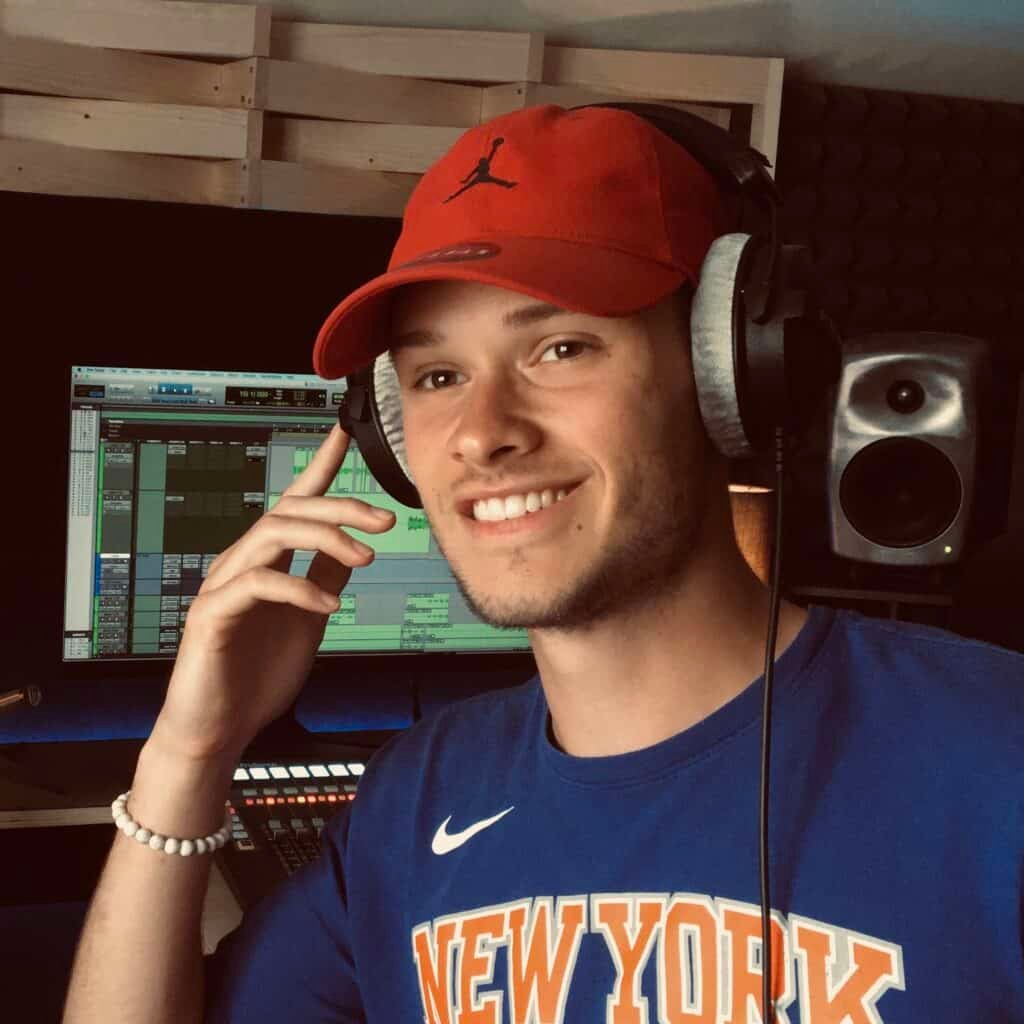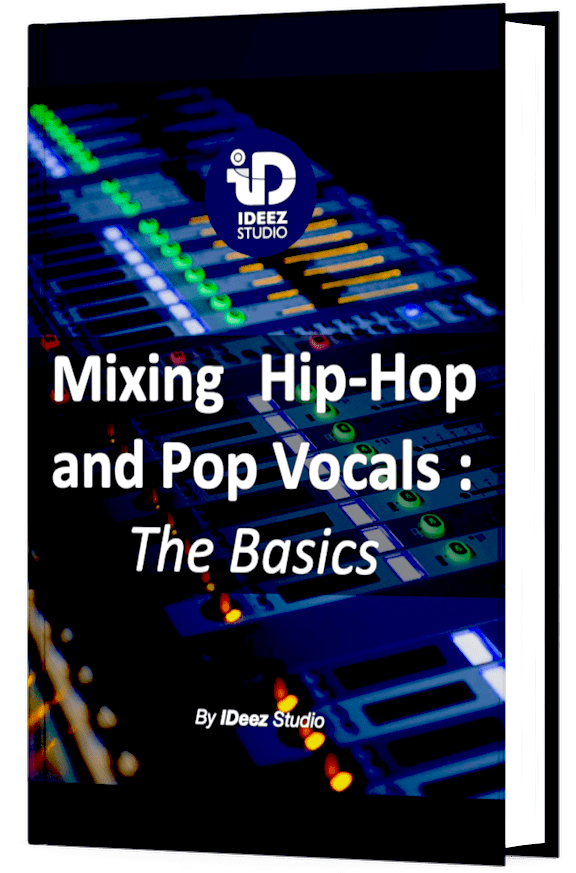In the dynamic realm of the music industry, a groundbreaking force is reshaping the landscape – artificial intelligence (AI). And the question on everyone’s mind is, “Will AI replace music producers?” In this article, we’ll deeply dive into this very interesting intersection between creativity and technology.

Before we start…
For decades, music producers have been revered for their unique blend of creativity and technical expertise. Sculpting the sonic tapestry that defines musical masterpieces.
However, the advent of AI in music production introduces a new challenging established norms. And it’s redefining the collaborative synergy between human ingenuity and machine capabilities.
AI-generated compositions, automated beat and melody creation, AI-generated vocals or even synthesizers,… While this may be a bit scary for us music producers, it’s fair to say that it’s impressed us all over the last few months/years.
In this article, we peer into the future, contemplating whether AI stands poised as a collaborative partner or a potential successor to human music producers.

The role of music producers in 2024
Nowadays, the role of music producers is to blend artistic intuition with technical mastery to bring sonic visions to life. At the core of their multifaceted role lies the ability to translate raw creativity into a polished, harmonious piece of art: a song.
In other words, music producers are the architects of sound. Responsible for guiding artists through the intricate process of composition, arrangement, and recording.
Beyond the studio, producers are often collaborators. Working hand-in-hand with musicians to capture the essence of their vision. They serve as mediators between the artist’s emotive expression and the technical intricacies of sound engineering.

Moreover, the role of music producers extends into the realms of innovation. Increasingly so, producers explore new sonic landscapes, experiment with emerging technologies, and push the boundaries of conventional genres.
As you can understand, their influence extends beyond the studio walls! As we delve into the question of AI potentially replacing music producers, it becomes imperative to understand and appreciate the multifaceted nature of their current role.

The current role of AI in music production
Now that we explored the role of music producers, let’s explore the current role of AI in music production! But also what this technology can bring to modern music producers.
1. AI in Music Composition
AI scores a lot of points in the field of music composition. For the simple reason that it can absorb the intricacies of diverse musical styles and genres easily! This leads AI to compose original pieces that not only echo the nuances of established genres but also venture into unexplored sonic territories.
Aiva is one of these tools. Capable of creating complex chord progressions and a very solid base of arrangements. Depending on the key, rhythm, mood and genre chosen by the user, Aiva will generate one or more multi-track compositions… in a matter of seconds.
Amper Music also has a very powerful AI for music composition. But unlike Aiva, it’s more an inspirational tool than a technical one. In fact, by selecting several criteria, Amper will suggest several musical algorithms, called Descriptor. A different approach but still very powerful.
This algorithmic diversity and acuity enables AI to craft compositions that seamlessly blend elements from different genres, creating a musical tapestry that transcends traditional boundaries.
But these tools may look overpowering, there’s something very interesting to come out of them. Instead of replacing human creativity, AI often serves as a co-creator. Offering suggestions, generating melodic variations, and acting as an innovative springboard for human musicians.

2. Automated beat and melody creations
As well as being a powerful tool for composition, AI can also create melodies, rhythmic patterns and beats of all kinds.
This is the case with Serato, for example. An intelligent DAW that lets you create instrumentals quickly and efficiently, with the help of an AI. And while it may seem a rather “limited” tool in terms of creativity, think again! Because Serato literally has no limits.
Impressive as it may seem, this kind of AI-powered tools are now capable of swiftly generating intricate rhythmic patterns, harmonies, and melodies. This not only accelerates the production process but also injects a fresh dynamism into the creative workflow, offering producers an abundance of material to sculpt into unique compositions.
But, once again, it’s a matter of collaboration between human producers and AI. Rather than supplanting human creativity, AI acts as a catalyst for inspiration, providing a canvas upon which producers can layer their artistic vision.
Looking for a professional sound engineer specializing in pop and hip-hop music ? You’re in the right place! Mixing, mastering, production, editing,… we’ve got it all covered!
Let’s start now!
3. AI-generated vocals and Synths
Today, AI (Artificial Intelligence) is also capable of generating vocals and synthesizers according to very precise criteria. Not just timbres and notes alone, but also melodies with a certain dynamic, velocity and, in the case of vocals,… words!
When it comes to vocals, Uberdeck is THE website to visit. They’ve got all the Artificial Intelligences that could possibly be voice-related on their platform. And in the field of music production, you can use Uberdeck to either generate known vocals, or generate your own designed vocals to attach to your instrumental. Just crazy!
Today’s AI can also generate very specific synthesizer sounds thanks to a few adjectives or sound types. Sistema2 is one of the best tools in this field.
But it’s important to note that AI doesn’t generate these sounds on its own. It will always feed on what has been done in the past, or on data provided by one or more human beings.
AI will never be able to create anything outside of what has been implemented as knowledge. And in the case of music production, this is essential to remember. But before discussing this subject in greater depth, let’s look at one final area in which AI is showing its performance in music production.
4. AI-assistant for sound design
In modern music production, more and more plug-ins feature AI assistants. But what exactly does this mean?
It means that the AI is included in the plugin not to generate anything, but to make suggestions and proposals. In other words, to guide the user according to what he/she is looking for.
This is the case, for example, with Auto-Tune’s Vocal Reverb, which, according to the criteria chosen by the user, will suggest presets and parameters that correspond to the request. The user is free to modify this suggestion with all the parameters at his/her disposal.

Another example is Neutron from iZotope. In its latest version, the plugin provides a tool for matching the tone of a sound from the mix/production session with an external sound.
In just a few seconds, the tool analyzes the tone, timbre, duration, velocity and dynamics of the reference sound, and then adapts the tone to the external sound.
It’s an extremely convenient tool for sound design. Many producers would have dreamed of having this technology a few years ago!
But, again… Users guide the AI!

Challenges and Limitations of AI
1. Emotional and intuitive aspect
At the risk of going into analyses that might seem a little too philosophical, music is the fruit of deep human feelings. It’s something that can’t be touched or smelt, but that everyone has known for a long time.
It has the impressive capacity to produce sensations that go beyond science. It makes our souls vibrate in their deepest depths, linking people indirectly and creating unforgettable memories.
This is exactly how music has always been produced and created: through the deep emotions and feelings buried in the hearts of artists, singers, producers,…
Is AI capable of imitating all this perfectly? The answer is simple: it can’t, and it never will. The authenticity of human emotions will forever remain inimitable.
AI has no emotions, no soul that can enable it to do what humans are capable of. And this is one of its biggest limitations.

2. Uniqueness and dependency on training data
Uniqueness is still a major challenge for AI in the art world. And music in particular. Let’s not forget that the AIs we encounter every day were not born alone. They are created by humans.
This means that AI is only fed by training data. And anything that comes out of this data is strictly out of the AI’s reach. Humans, on the other hand, can constantly evolve and learn in real time.
This strict dependence on training data creates limits that are still very noticeable today. And as well as giving the user technical barriers, it also raises questions about the uniqueness of what AI offers. Won’t training data standardize modern music too much?
3. Limited understanding of context
In music production, context is an essential element in creating the desired end product. The type of context can vary greatly for the creator: emotional, political, temporal… But also for the song itself.
Removing context from a track is like removing everything that could potentially set one track apart from another, making it unlike and similar to other tracks.
However, AI is often “unaware” of the context(s) involved in creating (or mixing and mastering) a piece of music.
And even if the human can of course give it precise information, there will always be a deeper context of which the human himself is unaware. And yet it’s all the more important in music production.

4. Technical constraints
In modern music production, AI can assist the user in numerous ways. By offering suggestions for parameter choices, by suggesting presets based on information given by the user, or by creating melodic sequences, patterns or even arrangements based on indications given.
But is AI capable of deeply “understanding” what it’s being asked to do? Certainly not, and the limits are still very apparent in anything that requires more complexity.
For example, very few artificial intelligence tools would be capable of producing a complex symphony by separating each (type of) instrument track by track, leaving the user free to control the dynamics, velocity or effects applied to each instrument. I don’t think any modern AI is capable of such a technical feat.
In purely technical terms, humans will always be one step ahead of AI. For now…

5. Legal issues
In just a few years, AI has become a standard in music production. Or at least, every professional music producer has already experienced it. But this new intelligence has arrived so quickly that no one has reacted to the legal aspect of AI in music production.
As AI-generated music gains prominence, there still may be legal challenges regarding copyright, ownership, and intellectual property. Determining the rights and responsibilities in collaborative efforts between AI systems and human creators is an evolving area.
But this legal uncertainty could discourage many producers from using AI in their compositions, mixes and productions.

Conclusion
AI showcases remarkable capabilities in generating compositions, crafting beats or shaping soundscapes. And it grapples with the intricacies of emotional depth, originality, and the subjective nuances inherent in the art of music. The limitations of AI highlight the irreplaceable role of human touch in the creative process.
Since AI has (and always will have) technical, emotional and contextual limitations that humans will never have, it’s fair to say that AI will never replace music producers.
But we music producers are going to have to learn to collaborate, work and live with AI. In music production, it will play an increasingly important role in our workflow and production processes. And those who don’t use AI will surely be the big losers in this technological arrival that is redefining today’s society… and the music industry at the same time!
My favorite tools for mixing pop and hip-hop music:
Plugins
In the field of auto-tune, I’m convinced that nothing’s better and more efficient than Antares Auto-Tune Pro. As for the EQ’s, FabFilter Pro-Q3 and Slate Digital Infinity EQ are, in my opinion, the best tools. For compression, I have 2 favorites plugins: Waves RComp and UAD EL8 Distressor.
As for reverb, I’m a big fan of the Soundtoys Little Plate, but generally, I go for the Valhalla VintageVerb for its versatility. I also love the Arturia Rev PLATE-140 and the UAD Pure Plate for its organic side.
Headphones
The closed headphones I love and will always love using for mixing pop and hip-hop music are the Beyerdynamic DT-770. As for the best open-back headphones, I use the Sennheiser HD600 headphones, and I’m really happy of them!
Monitors
Having a pair of Yamaha HS7 in its studio or home studio is always cool for more excitement while listening to your mixes. The Adam Audio T7V monitors are also super accurate. In my studio, I also have a pair of Genelec 8030 for their reliability.
Hardware gear
For anyone who wants to start using hardware in their mixes, I always recommend these 2 units from Klark Teknik: the EQP-KT and the 76-KT. Don’t forget to use good converters, such as the Apollo interfaces. This is essential for a good rendering.






